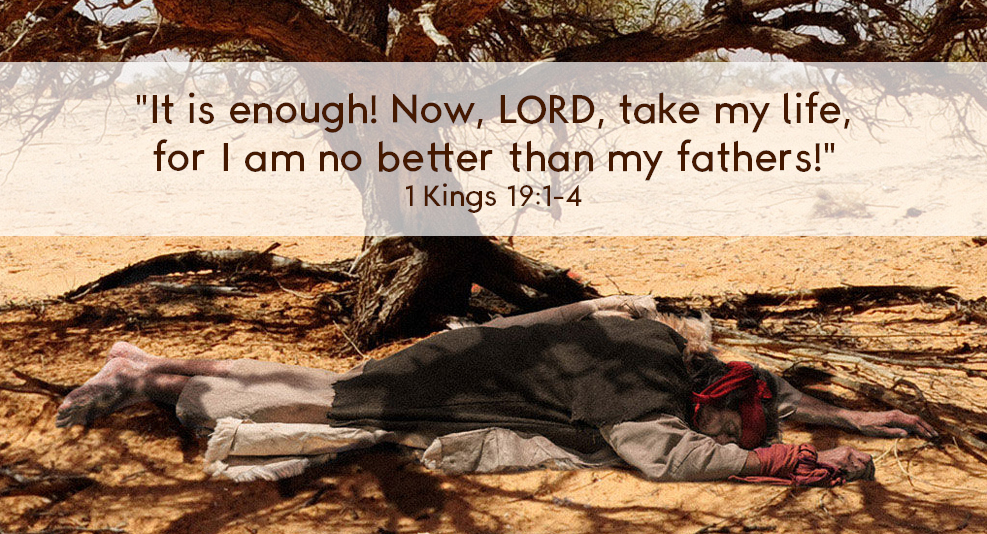
There was a time when Elijah wanted to die. God had answered his prayer and defeated the prophets of Baal right in front of him (see 1 Kings 18). The surprising thing is that his reaction to Jezebel’s threat was to run. In a way, that is comforting to me. Even the BIG saints have their off days after all.
And Ahab told Jezebel all that Elijah had done, also how he had executed all the prophets with the sword. Then Jezebel sent a messenger to Elijah, saying, “So let the gods do to me, and more also, if I do not make your life as the life of one of them by tomorrow about this time.” And when he saw that, he arose and ran for his life, and went to Beersheba, which belongs to Judah, and left his servant there. But he himself went a day’s journey into the wilderness, and came and sat down under a broom tree. And he prayed that he might die, and said, “It is enough! Now, LORD, take my life, for I am no better than my fathers!” 1Kings 19:1-4
Spurgeon notes (see below) that God doesn’t always answer prayer the way we’d hope. And that’s always a good thing. Often God will give you something far better. In Elijah’s case, instead of been granted death, he was nourished by an angel of the Lord.
From Charles Spurgeon’s May 19th - Evening Reading
It was a remarkable thing that the man who was never to die, for whom God had ordained an infinitely better lot, the man who should be carried to heaven in a chariot of fire, and be translated, that he should not see death-should thus pray, “Let me die, I am no better than my fathers.” We have here a memorable proof that God does not always answer prayer in kind, though He always does in effect. He gave Elias something better than that which he asked for, and thus really heard and answered him. Strange was it that the lion-hearted Elijah should be so depressed by Jezebel’s threat as to ask to die, and blessedly kind was it on the part of our heavenly Father that He did not take His desponding servant at his word. There is a limit to the doctrine of the prayer of faith. We are not to expect that God will give us everything we choose to ask for. We know that we sometimes ask, and do not receive, because we ask amiss. If we ask for that which is not promised-if we run counter to the spirit which the Lord would have us cultivate-if we ask contrary to His will, or to the decrees of His providence-if we ask merely for the gratification of our own ease, and without an eye to His glory, we must not expect that we shall receive. Yet, when we ask in faith, nothing doubting, if we receive not the precise thing asked for, we shall receive an equivalent, and more than an equivalent, for it. As one remarks, “If the Lord does not pay in silver, He will in gold; and if He does not pay in gold, He will in diamonds.” If He does not give you precisely what you ask for, He will give you that which is tantamount to it, and that which you will greatly rejoice to receive in lieu thereof. Be then, dear reader, much in prayer, and make this evening a season of earnest intercession, but take heed what you ask.
Elijah never did see death. When Elijah wanted to die, God did not answer his prayer literally. God eventually gave him something far better.
By faith Enoch was taken up so that he should not see death; and he was not found because God took him up; for he obtained the witness that before his being taken up he was pleasing to God. Heb 11:5
See our previous article The Rapture of Enoch
